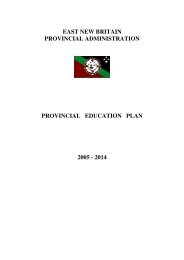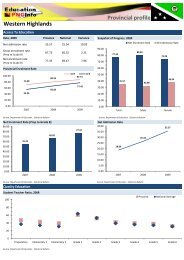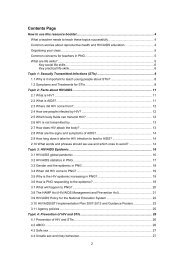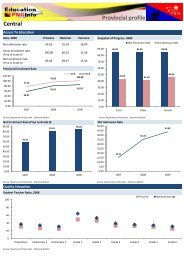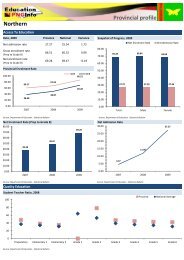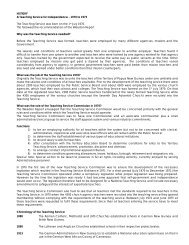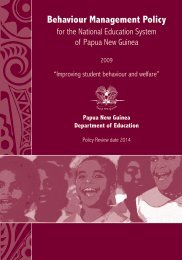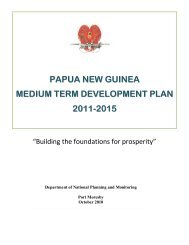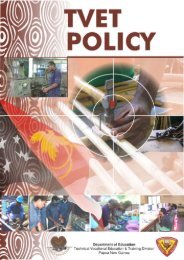Capacity Development Plan project update No. 8, 25 May 2012
Capacity Development Plan project update No. 8, 25 May 2012
Capacity Development Plan project update No. 8, 25 May 2012
- No tags were found...
Create successful ePaper yourself
Turn your PDF publications into a flip-book with our unique Google optimized e-Paper software.
Education Sector <strong>Capacity</strong> Needs Analysis and <strong>Capacity</strong> <strong>Development</strong> <strong>Plan</strong>14 March: the <strong>Capacity</strong> <strong>Development</strong> Technical Working Group met at the Gateway Hotel anddetermined that the DWU-VSO team would write one <strong>Capacity</strong> <strong>Development</strong> <strong>Plan</strong> integratingrecommendations from the Ernst and Young Institutional Assessment report.19-23 March: familiarization discussions took place with senior DOE and AusAID officers including apresentation to the Top Management Team (TMT). The Key deliverable 1 Inception Report wassubmitted to the Secretary on Friday 23 March <strong>2012</strong>.27 March <strong>2012</strong>, TMT accepted the Inception Report which was Key Deliverable <strong>No</strong>. 1.26-30 March, R. Jones and C. <strong>No</strong>ngkas took advantage of the opportunity in Madang to meet withCatholic Education Principals, Regional Standards and Guidance Directors, and all Momase Provincialand District Education Advisers (DEAs). Also the team thanks PPR officers for collecting data fromIslands’ PEAs and DEAs in Kokopo.3 April: the team leader gave a brief <strong>update</strong> to the Top Management Team2-6 April: the DWU-VSO team conducted individual interviews with senior NDoE managers andnational stakeholders such as the Secretary, Deputy Secretaries, First Assistant Secretaries, AssistantSecretaries, national church education officers, Teaching Service Commission, Library and Archives,and partners in education AusAID, EU, JICA, United Nations, and World Bank.16-27 April <strong>2012</strong>: Two weeks of the data gathering at the national level in Port Moresby from staff,managers and superintendents of various divisions and organizations. Themes of capacity needsemerging from the data are: grooming leaders, housing, finance, coordination, communication,professional development, some restructuring, electronic management of data, and on-going ICTtraining for all staff.30 April to 4 <strong>May</strong> <strong>2012</strong>: Gathering data in the Madang Province. In addition to interviews and focusgroups in the Madang town, team members travelled to rural areas and gathered data from theUsino-Bundi District and Bogia District. Themes emerging from the data at the provincial level weresimilar to those at the national level. However themes emerging at the district level were verydifferent and included: non-receipt of education subsidies, inefficient procedures for accessingschool funds, inadequate planning for UBE, inadequate supplies of curriculum materials for studentnumbers, lack of clarity over charging <strong>project</strong> fees, borrowing positions from one school to another,professional development for members of Boards of Management, staff instability/high turnover,gender inequality, low levels of female student retention, and inadequacy of visits by agencyadvisers.7-11 <strong>May</strong> <strong>2012</strong>: The study team gathered data in the National Capital District and the SimbuProvince. Particular strengths of education in NCD were high numbers of women teachers, women inleadership roles, an ample supply of teachers to be employed, an English language media richenvironment, a strong tertiary sector and ease of access to services and supplies. Of greatestconcern in NCD were overcrowded classrooms with 70 to 80 students in a class; elementary classesbeing conducted outdoors as rooms were needed for increasing numbers of primary students; andinadequacy of classrooms, toilets and teaching and learning resources for increased studentnumbers. Housing, transport and safety issues for staff and students were also concerns.14-18 <strong>May</strong> <strong>2012</strong>: The DWU-VSO team visited East New Britain Province (Rabaul, Kokop, Gazelle) andWestern Province (Daru, Kiunga, Tabubil). A key feature of East New Britain was the impressive



